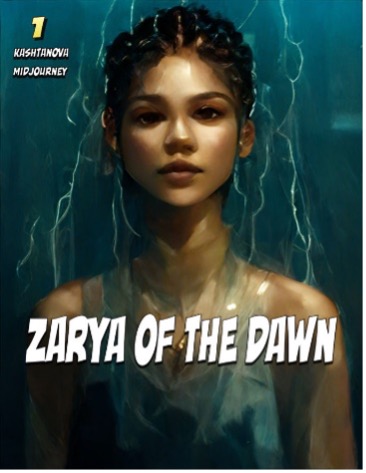
Artificial Intelligence and the Copyright Dilemma

Over the past few years, artificial intelligence (AI) has taken center stage in the development of creative works. Creators can now enter prompts into AI platforms like ChatGPT, Midjourney, and Stability Diffusion to generate works. As AI becomes more and more integrated in our daily lives, creators must consider the legal implications of their use of these platforms.
A Recent Entrance to Paradise
The following painting, titled “A Recent Entrance to Paradise,” is at the forefront of the debate over whether AI-generated works qualify for copyright protection:

AI researcher Stephen Thaler filed a copyright application for the painting in November 2018, listing himself as the owner, and the AI – which he calls the “Creativity Machine” – as the author.[1] After his original application was denied, Thaler filed multiple reconsideration requests for registration; each time, the USCO has rejected the application, finding that the work does not have the “human authorship” necessary to obtain copyright protection.[2] According to the USCO, copyright law is limited to “original intellectual conceptions of the author,” and the work cannot obtain copyright registration because a human did not create the work.[3]
A central purpose of copyright protection is to incentivize the creation and encourage dissemination of “socially valuable works.”[4] But what is incentivized, and whose incentives are at play? Thaler argues that allowing copyright protection of AI-generated works will encourage the development and use of creative AI, which in turn will result in generation of more works.[5] But according to the USCO, the purpose of copyright protection is to incentivize humans to create expressive works – on their own.[6] Under the utilitarian theory of copyright, exclusive monopoly rights encourage authors to create, and this in turn increases the amount of culturally valuable works.[7] These incentives have no bearing on a machine, which acts not on incentives but on human-issued commands.
Even more fundamental than the policy dispute is a constitutional issue. The Copyright Act is an exercise of Congress’s prerogative to “[t]o promote the progress of science and useful arts, by securing for limited times to authors and inventors the exclusive right to their respective writings and discoveries.”[8] The USCO will “refuse to register a claim if it determines that a human being did not create the work” because it understands “authors,” as used in the Copyright Clause, to refer to human beings.[9]
Zarya of the Dawn
For now, at least, the USCO’s policy on AI-generated works is clear: any portion of a work generated by AI will not be granted copyright registration. But that does not rule out copyright registration for works that incorporate AI-generated material. Last month, the USCO issued a partial acceptance and rejection of registration over the graphic novel, Zarya of the Dawn.[10] Author Kris Kashtanova fed thousands of text prompts into AI image generator Midjourney to generate images for the novel (as shown below).[11] Kashtanova claims that they went through “hundreds of iterations,” edited some of the images generated by Midjourney, and put several hours of labor into creating the novel.[12]

The USCO granted registration over the text and the selection and arrangement of the images in the novel but denied registration for the individual images themselves, finding that Kashtanova’s use of Midjourney was akin to hiring a visual artist whose work a patron cannot claim as their own.[13] The USCO explained that even if a human enters prompts into an AI tool, they still lack a level of control over what the AI produces.[14]
Conclusion
Content creators who use AI should be cognizant of the USCO’s “human authorship” requirement and its nuances. The USCO is the gatekeeper for copyright registration – which in turn allows creators to sue others for infringement, establishes a public record of ownership, and provides evidence of the copyright’s validity.[15] Based on the USCO’s current stance on “human authorship,” portions of a work generated by an AI cannot obtain copyright protection. We can expect these legal boundaries to be constantly tested, probed, and clarified, as AI and its uses evolve. As this technology grows and evolves, prudent technologically progressive creators will keep in touch with their lawyers to determine best practices for the use of AI and to develop an IP strategy.
[1] Blake Brittain, Computer scientist says AI ‘artist’ deserves its own copyrights, Reuters, Jan. 11, 2023, https://www.reuters.com/legal/litigation/computer-scientist-says-ai-artist-deserves-its-own-copyrights-2023-01-11/.
[2] See Re: Second Request for Reconsideration for Refusal to Register A Recent Entrance to Paradise, Copyright Review Board, Feb. 14, 2022, https://www.copyright.gov/rulings-filings/review-board/docs/a-recent-entrance-to-paradise.pdf.
[3] Id.
[4] Jeanne C. Fromer, Expressive Incentives in Intellectual Property, 98 Virginia L. Rev. 1, 4 (2012), https://www.law.stanford.edu/wp-content/uploads/sites/default/files/event/265497/media/slspublic/Expressive_Incentives_in_Intellectual_Property_1.pdf.
[5] Plaintiff’s Motion for Summary Judgment, supra note 6, at 1.
[6] Defendants’ Response to Plaintiff’s Motion for Summary Judgment and Cross Motion for Summary Judgment at 25, Thaler v. Perlmutter, No. 1:22-cv-01564-BAH (D.D.C. Feb. 7, 2023).
[7] Fromer, supra note 7.
[8] U.S. Const. art. 1, § 8, cl. 8 (emphasis added).
[9] U.S. Copyright Office, Compendium of U.S. Copyright Office Practices § 306 (3d ed. 2021).
[10] See Re: Zarya of the Dawn, United States Copyright Office, Feb. 21, 2023, https://www.copyright.gov/docs/zarya-of-the-dawn.pdf.
[11] Tony Analla, Zarya of the Dawn: How AI is Changing the Landscape of Copyright Protection, Jolt Digest at Harvard Law, Mar. 6, 2023, https://jolt.law.harvard.edu/digest/zarya-of-the-dawn-how-ai-is-changing-the-landscape-of-copyright-protection; see also Stephen Wolfson, Zarya of the Dawn: US Copyright Office Affirms Limits on Copyright of AI Outputs, Creative Commons, Feb. 27, 2023, https://creativecommons.org/2023/02/27/zarya-of-the-dawn-us-copyright-office-affirms-limits-on-copyright-of-ai-outputs/.
[12] Id.
[13] U.S. Copyright Office, supra note 11.
[14] Id.
[15] U.S. Copyright office, supra note 5, at § 202.